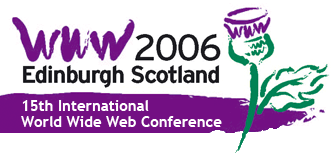Refereed Track: E* Applications: E-Commerce, E-Business, E-Science, E-Learning, and E-Communities
Internet and Web technologies enable new kinds of applications, usually prefixed with a capital "E" as in E-Commerce, E-Business, E-Learning, E-Science or E-Communities. Such applications are often innovative in their use of these technologies, and support or require new work, learning, or business scenarios. Furthermore, focusing on these E* Applications leads to new requirements as well as to interesting new technologies or extensions of existing ones.
The E* Applications Track, new to WWW in 2006 (but unifying and broadening previous WWW tracks in each of E-commerce, education, and applications), provides a unique forum both for describing innovative E* applications and scenarios as well as innovative technologies for these areas. We welcome both studies relating to specific classes of E-Applications and to cross-cutting issues. Relevant topics include, but are not restricted to, the following:
- Service architectures — distributed Web services; web service
technologies for e-Applications; embedded Web applications; Web
standards for E* applications; data protection, security and
privacy; ubiquitous computing and internet appliances;
recommendation, reputation, and trust systems; computational
markets for information services
- Data management — distributed and peer-to-peer-based learning
and e-science repositories; scientific metadata and annotation
management; intellectual property and digital rights management;
data and workflow provenance for e-Science; scientific data
quality and data cleaning
- Web-based collaboration and communities — collaboration and
communities in web-based educational environments; E-Learning and
E-Science community portals; synchronous collaboration
applications and services; enterprise collaboration tools;
- Web-based workflows — scientific workflows and process
automation; automated shopping, trading, and contract management;
supply chains, coalitions, and virtual enterprises;
web-based problem-solving environments for e-Science
- Ontologies and the semantic web — semantic Web and ontologies
for E* applications; ontology-based data integration and
analysis; languages for describing goods, services and contracts;
ontologies for e-Science; conceptual modeling and knowledge
represention for e-Science
- Data processing and visualization — data mining, analysis, and
statistics in e-Science; scientific visualization and e-Science
- Experience Reports and case studies for E* applications
Accepted Papers
John Debenham Simeon Simoff Ding Zhou Eren Manavoglu Jia Li C. Lee Giles Hongyuan Zha Vladimir Soroka Sheizaf Rafaeli Vaclav Petricek Tobias Escher Ingemar J. Cox Helen Margetts Elizabeth Brown Tim Brailsford Tony Fisher Adam Moore Helen Ashman K. Faith Lawrence mc schraefel Satya S. Sahoo Christopher Thomas Amit Sheth William S. York Samir Tartir Mingyu Feng Neil T. Heffernan Kenneth R. Koedinger Nominated for Best Student Paper AwardChairs
- Mark Manasse , Microsoft Research, USA (Co-Vice Chair)
- Bertram Ludaescher, UC Davis, USA (Co-Vice Chair)
- Wolfgang Nejdl, L3S and University of Hannover, Germany (Co-Vice Chair)
PC Members
- Mark Manasse, Microsoft Research, USA (Co-Vice Chair)
- Bertram Ludaescher, UC Davis, USA (Co-Vice Chair)
- Wolfgang Nejdl, L3S and University of Hannover, Germany (Co-Vice Chair)
- Jürgen Angele, Ontoprise, Germany
- Lora Aroyo, Eindhoven University of Technology, The Netherlands
- Helen Ashman, University of Nottingham, UK
- Wolf-Tilo Balke, L3S and University of Hannover, Germany
- Elisa Bertino, Purdue University, USA
- Kalina Bontcheva, University of Sheffield, UK
- Shawn Bowers, UC Davis, USA
- Peter Brusilovsky, University of Pittsburgh, USA
- Rajkumar Buyya, University of Melbourne, Australia
- Vasa Curcin, Imperial College London, UK
- John Domingue, Knowledge Media Institute, UK
- Erik Duval, University of Leuven, Belgium
- Thomas Fahringer, University of Innsbruck, Austria
- Christoph Freytag, Humbolt University, Berlin, Germany
- Michael Gertz, University of California, Davis, USA
- Moustafa Ghanem, Imperial College London, UK
- Mark Greenwood, University of Manchester, UK
- Jeffrey Grethe, UC San Diego, USA
- Pilar Herrero, Polytechnic University of Madrid, Spain
- Andreas Hoheisel, Fraunhofer-Gesellschaft, Germany
- Nick Jennings, University of Southampton, UK
- Rohit Khare, CommerceNet
- Alfred Kobsa, UC Irvine, USA
- Rob Koper, Open University Netherlands, The Netherlands
- Ulf Leser, Humbolt University, Berlin, Germany
- Bob Mann, Royal Observatory, Edinburgh, UK
- Erica Melis, DFKI, Germany
- Peter Murray-Rust, Cambridge University, UK
- James Myers, National Center for Supercomputing Applications, USA
- Peter Rice, European Bioinformatics Institute, UK
- Rizos Sakellariou, University of Manchester, UK
- Daniel Schwabe, PUC Rio, Brazil
- Peter Scott, Knowledge Media Institute, UK
- Amit Sheth, University of Georgia and Semagix, USA
- Matthew Shields, University of Cardiff, UK
- Heinz Stockinger, University of Vienna, Austria
- Denise Tolhurst, University of New South Wales, Australia
- Ron van Schyndel, RMIT University, Australia
- Vincent Wade, Trinity College Dublin, Republic of Ireland
- Limsoon Wong, Agency for Science, Technology & Research, Singapore
Additional Reviewers
|


